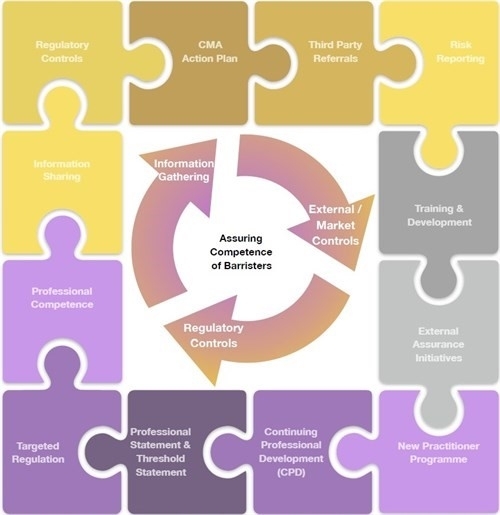As a public interest regulator, we have a public duty to ensure barristers meet the standards we set for them. We are committed to doing so in a risk- and evidence-based way.
Details of our approach
We have developed a regulatory framework that supports the profession to take greater responsibility for its own professional competence and, therefore, to limit regulatory intervention to where it is most needed. There are three main ways in which our regulatory framework assures the competence of barristers:
- By considering the effectiveness of the regulatory controls that we have put in place to assure competence;
- By considering the effectiveness of the work by other organisations to assure competence;
- By encouraging referrals of reports on individual performance, so that we can work with individuals to raise standards and identify trends.

The diagram above outlines the evidence we are using to assure ourselves, the profession and the public, of the competence of barristers. Taking each in turn:
Regulatory Controls
There are several regulatory controls in place which assure the competence of barristers, stemming from a requirement in the BSB Handbook that barristers should not undertake work unless competent do so. Barristers are required, from day one of practice and as an ongoing requirement through our Continuing Professional Development (CPD) scheme, to have the knowledge, skills and attributes outlined in the Professional Statement and Threshold Standards.
Where we have a particular concern about professional competence, we may introduce targeted regulation, for example, there are specific competence and registration requirements in relation to Youth Court advocacy and specialist guidance for immigration practitioners.
Information gathering
We are working to ensure that we are sharing information with relevant organisations as efficiently as possible, alongside encouraging reports from third parties around competence.
If you would like to give us information about the competence of a barrister, you can do so through our online reporting form.

